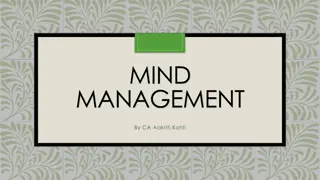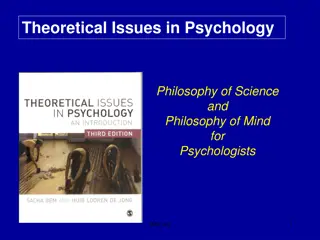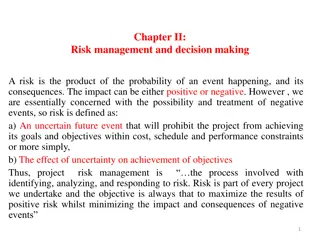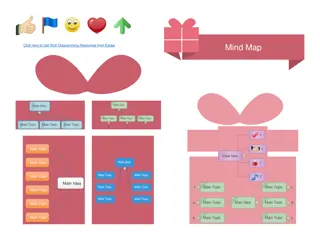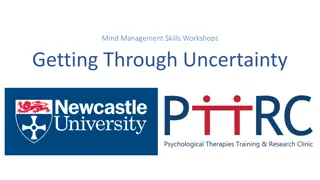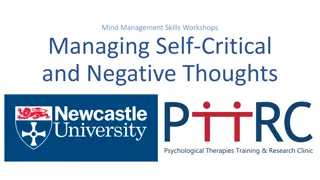Mind Management Skills Workshop: Dealing with Setbacks
Enhance your skills in managing setbacks with this interactive 90-minute workshop. Respect confidentiality, share respectfully, and seek further support if needed. Reflect on homework tasks and set goals for challenging negative thoughts and behaviors. Today's goals include understanding setbacks, common experiences, and practicing techniques for minimizing their impact on your life.
Download Presentation

Please find below an Image/Link to download the presentation.
The content on the website is provided AS IS for your information and personal use only. It may not be sold, licensed, or shared on other websites without obtaining consent from the author. Download presentation by click this link. If you encounter any issues during the download, it is possible that the publisher has removed the file from their server.
E N D
Presentation Transcript
Mind Management Skills Workshops Dealing with Setbacks
Housekeeping Today s workshop will run for 90 minutes and is designed to be interactive we encourage participation Confidentiality you are not expected to share anything that you do not want to, anything disclosed will be kept confidential within the group please see confidentiality rules for further information Please be respectful of other group members who may choose to share their experiences maintain the confidentiality of the group
Further Support The workshops are designed to be skills-focussed, rather than problem- centred. However, if any of today s discussion or exercises cause you to experience distress, you may wish to pursue further support Full details can be found in the supporting information you received before this workshop: - Accessing the Student Health and Wellbeing Service - Listening services such as the Nightline and the Samaritans - How to access evidence-based therapy through the NHS
Homework Set Last Week Thought challenging and goal setting Using the vicious cycle, practice noticing unhelpful or negative thoughts and in response, begin to question and challenge them using the handouts provided Set goals to reduce unhelpful behaviour (such as procrastination or overcompensation) and increase helpful behaviour (desired goals and activity) plan what, when, where the goal will take place
Homework Review Were you able to complete the task? For those who are comfortable to share, can you reflect on your experience of the homework: What happened? What was it like? Did it help?
Goals for Today To build on the skill of noticing our thoughts, feelings and behaviours and their links within the context of experiencing a setback To hear about common setbacks experienced by PG students To practice the skills of challenging unhelpful thoughts and changing unhelpful behaviour when experiencing a setback with the aim of reducing its impact on our lives
Why this workshop for postgraduate students? To help us design our mind management workshops we ran focus groups with student volunteers to hear their experience of common issues which affected their wellbeing during their studies. One key theme shared amongst the focus group students was setbacks . Students discussed the impact of unexpected bad news on their PG studies and how it could detrimentally affect their mood and wellbeing. Experiencing a setback was linked with self-criticism and other problems discussed in previous workshops, such as imposter syndrome. We hope the following workshop will help you manage dealing with setbacks in a way that reduces their impact on your mood and wellbeing.
Common types of setback Type of setback Example Unexpected events Making an undetected error in data collection discovered weeks later Application for funding being rejected Undesirable outcomes A hypothesis being contradicted by recent publication Unable to answer key question when presenting and defending my work Barriers from peers Lab partner delaying their experiment I rely on Supervisor not getting back to me with critical feedback Any others? Psychological Therapies Training and Research Clinic; School of Psychology
Common types of unhelpful reaction to setbacks Reaction Example Dwell on it/self-criticism I m not good enough Why does this keep happening? Avoidance Putting off work to do with the setback, finding reasons to do other things Withdrawal Stopping work, hobbies, usual activities Overcompensation Constantly working/studying for long periods of time Worry What if I can t get back on track ? Seek reassurance Repeatedly asking peers or supervisor to check work Any others? Psychological Therapies Training and Research Clinic; School of Psychology
Vicious cycles Unhelpful responses to setbacks are common Depending on how the person responds, the impact of setbacks can pass quickly or linger on, causing greater impact The impact of setbacks can become prolonged when we fall into patterns of experiencing unhelpful thoughts, uncomfortable feelings and reactive behaviours Vicious cycles can occur, between what we think, how we feel and what we do Thoughts, emotions and behaviours Psychological Therapies Training and Research Clinic; School of Psychology
Vicious Cycle Exercise 1 generating alternatives Trigger Thoughts Behaviour Emotions Exercise 2 changing behaviour Psychological Therapies Training and Research Clinic; School of Psychology
Supervisor feedback highlighting a mistake I made early on, requiring me to repeat several experiments to obtain new data I ve messed this up, I can t do this, I m never going to get it right Put off starting the experiments, find other things to do to avoid thinking about the mistake Feel anxious, overwhelmed Psychological Therapies Training and Research Clinic; School of Psychology
Skills practice 1 In small groups of 2 or 3, using the vicious cycle handouts, consider an example of a time that you experienced a setback. Choose an example that is not too uncomfortable to reflect on and consider: - What situation, event or trigger was happening at the time? - What thoughts were going through your mind then? - How did those thoughts make you feel? (emotionally and/or physically) - How did the way you were feeling make you behave? What did you do at the time?
Generating Alternatives 1. Notice or pin down the negative thought I am noticing that I am having the thought that I am never going to get it right How accurate is this thought? How fair is it? What is the evidence for/against it? What would I say to a friend who was experiencing this thought? 2. Question the thought, reflect on it as a thought I may have missed something but that doesn t mean I am clueless. I am able to work out what I don t know and apply it. It is my supervisor s job to give me constructive criticism this will ultimately help me. Come to think of it, he has given me plenty of positive feedback before now 3. Generate a more balanced thought that fits the situation
Generating Alternatives 1. Notice or pin down the negative thought I am noticing that I am having the thought that I am never going to get it right How accurate is this thought? How fair is it? What is the evidence for/against it? What would I say to a friend who was experiencing this thought? 2. Question the thought, reflect on it as a thought I may have missed something but that doesn t mean I am clueless. I am able to work out what I don t know and apply it. It is my supervisor s job to give me constructive criticism this will ultimately help me. Come to think of it, he has given me plenty of positive feedback before now 3. Generate a more balanced thought that fits the situation
Finding the hot thought Having noticed and written down the thoughts experienced following the setback, it is helpful to know which one to target Look at each thought individually and ask yourself what emotion does this thought make me experience? and how strong /10 is this emotion? The hot thought will be the thought that is the most upsetting
Finding the hot thought Thought Emotion and strength /10 I ve messed up Disappointed 4/10 I can t do this Disappointed 5/10, sad 3/10 I m never going to get it right Anxious 7/10
Generating Alternatives 1. Notice or pin down the negative thought I am noticing that I am having the thought that I am never going to get it right How accurate is this thought? How fair is it? What is the evidence for/against it? What would I say to a friend who was experiencing this thought? 2. Question the thought, reflect on it as a thought I may have missed something but that doesn t mean I am clueless. I am able to work out what I don t know and apply it. It is my supervisor s job to give me constructive criticism this will ultimately help me. Come to think of it, he has given me plenty of positive feedback before now 3. Generate a more balanced thought that fits the situation
Thought challenging Hot thought: I am never going to get it right 80% belief, anxiety 7/10 Evidence against: on balance, there are far more things that I have got right in this study I have completed many more tests than tests that I have had to repeat in the past when I have struggled, I have been able to practice until I have achieved what I needed to Evidence for: I made a mistake that needs correcting and will take hours to make right I can think of a couple of other times I made similar mistakes Hot thought belief after: 30% Balanced thought belief: 80% Feelings after: hopeful 6/10, anxious 3/10 Balanced thought: although it is annoying and disappointing to have to repeat my work, this does not mean that I will never be able to get it right. If I think about what went wrong and what I can improve upon, I will get the results I need.
Skills practice 2 Thought challenging Using your vicious cycles and handouts identify a hot thought, rate how much you believed it at the time you thought it as a % Consider the factual evidence that supports the thought to be true Consider the factual evidence that contradicts the thought, that goes against it Re-rate how much you believe the thought Write down an alternative, more balanced thought that is a more accurate reflection of the situation
The importance of behaviours Antecedent Behaviour Consequences
Vicious Cycle Exercise 1 generating alternatives Trigger Thoughts Behaviour Emotions Exercise 2 changing behaviour Psychological Therapies Training and Research Clinic; School of Psychology
Supervisor feedback highlighting a mistake I made early on, requiring me to repeat several experiments to obtain new data I ve messed this up, I can t do this, I m never going to get it right Put off starting the experiments, find other things to do to avoid thinking about the mistake Feel anxious, overwhelmed Psychological Therapies Training and Research Clinic; School of Psychology
Changing behaviour Having noticed and written down the behaviours occurring in response to the setback, consider: What is the intended purpose (or short-term benefit) to behaving in this way? Are there any unintended consequences to this behaviour - On the situation? On the way that you think or feel?
Changing behaviour Behaviour Intended purpose Unintended consequence Put off starting the experiments The thought of starting the experiments causes anxiety, putting off starting causes relief from anxiety Delaying the work means I have less time and am under more pressure, so the feeling of anxiety about the experiments grows Finding other bits of work to do instead of what needs addressing This can make me feel productive in the short-term Working on other things instead of what needs to be done is a subtle way of avoiding the task, same consequences of more anxiety and less time
Changing behaviour Having reflected on the behaviour, its intended purpose and unintended consequences, take time to consider an alternative behaviour that would result in a more desirable outcome Plan specifically when this behaviour will be enacted What will I do? When will I do it? How long will it take? Who may I need to involve?
Acting against your inclination When experiencing setbacks it is common to not feel like behaving differently in response However, doing what you feel like doing when having unhelpful thoughts and difficult feelings may lead to a vicious cycle Doing something different may be difficult at first you may not feel like it, but doing it anyway regardless of your mood can result in your feelings changing The process of noticing, reflecting and working out the purpose will help to make the chances of you doing a new action more likely Psychological Therapies Training and Research Clinic; School of Psychology
Skills Practice 3 changing behaviour Using your vicious cycle examples when experiencing a setback, take some time to consider your behaviour at the time and work through the process of generating an alternative behaviour: 1) What was the intended purpose of this behaviour in response to the setback? 2) Were there any unintended consequences? 3) What alternative behaviour could be enacted that would lead to a more desirable outcome?
Treating Behaviours as an Experiment Sometimes the way we think is what gets in the way of us doing something we want to do E.g. I will never get the job causing a person to avoid applying If we act in a way that means or thoughts are true, how will we experience change within these thoughts? By experimenting with new behaviours that go against what we think or fear will happen, we can often learn something new that we weren t expecting
Homework: practice This week, take the time to practice noticing mood changes In response, use the vicious cycle handouts to map out the interaction between your thoughts, feelings and behaviours The additional handouts will help you challenge unhelpful thoughts and change unhelpful behaviours Consider practicing with these resources when experiencing any setbacks this week Report back next week
Key Messages Setbacks are common we can t avoid them Our reaction to setbacks (our thoughts, emotions and behaviour) can determine its impact on our lives Learning to notice and reflect on our thoughts and behaviours can help us change those that are unhelpful Challenging unhelpful thoughts and experimenting with alternative behaviour will cause emotional change in the face of the setback
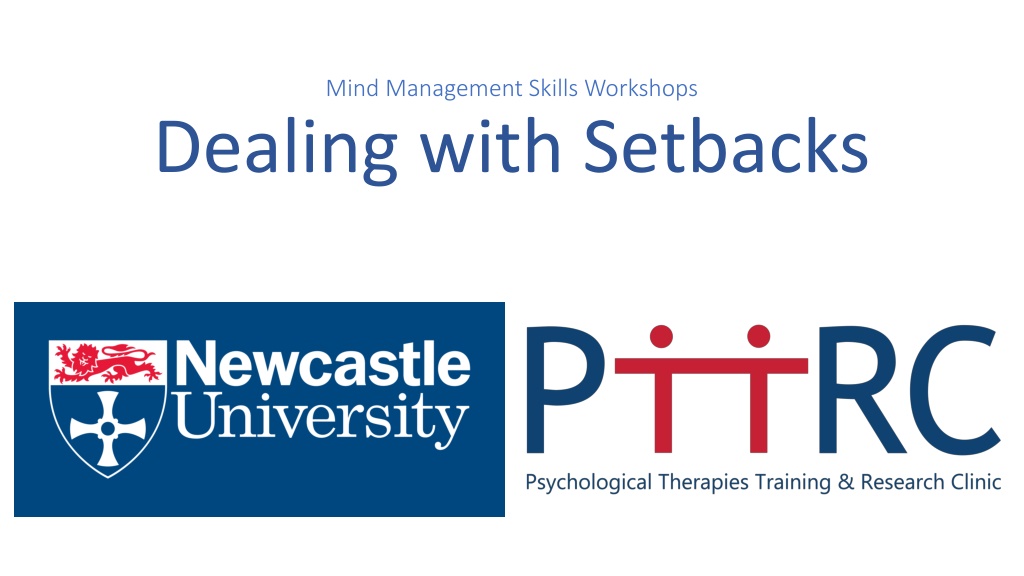








![[PDF⚡READ❤ONLINE] Zen Mind, Beginner's Mind: 50th Anniversary Edition](/thumb/20459/pdf-read-online-zen-mind-beginner-s-mind-50th-anniversary-edition.jpg)




